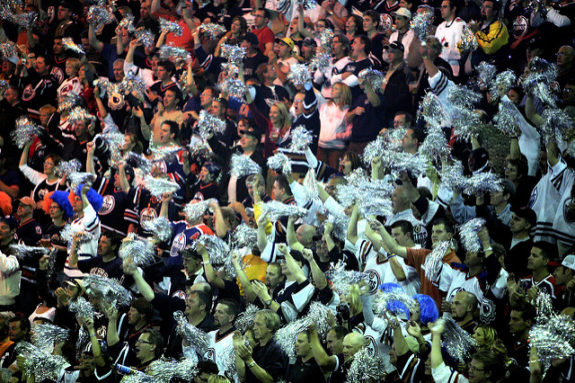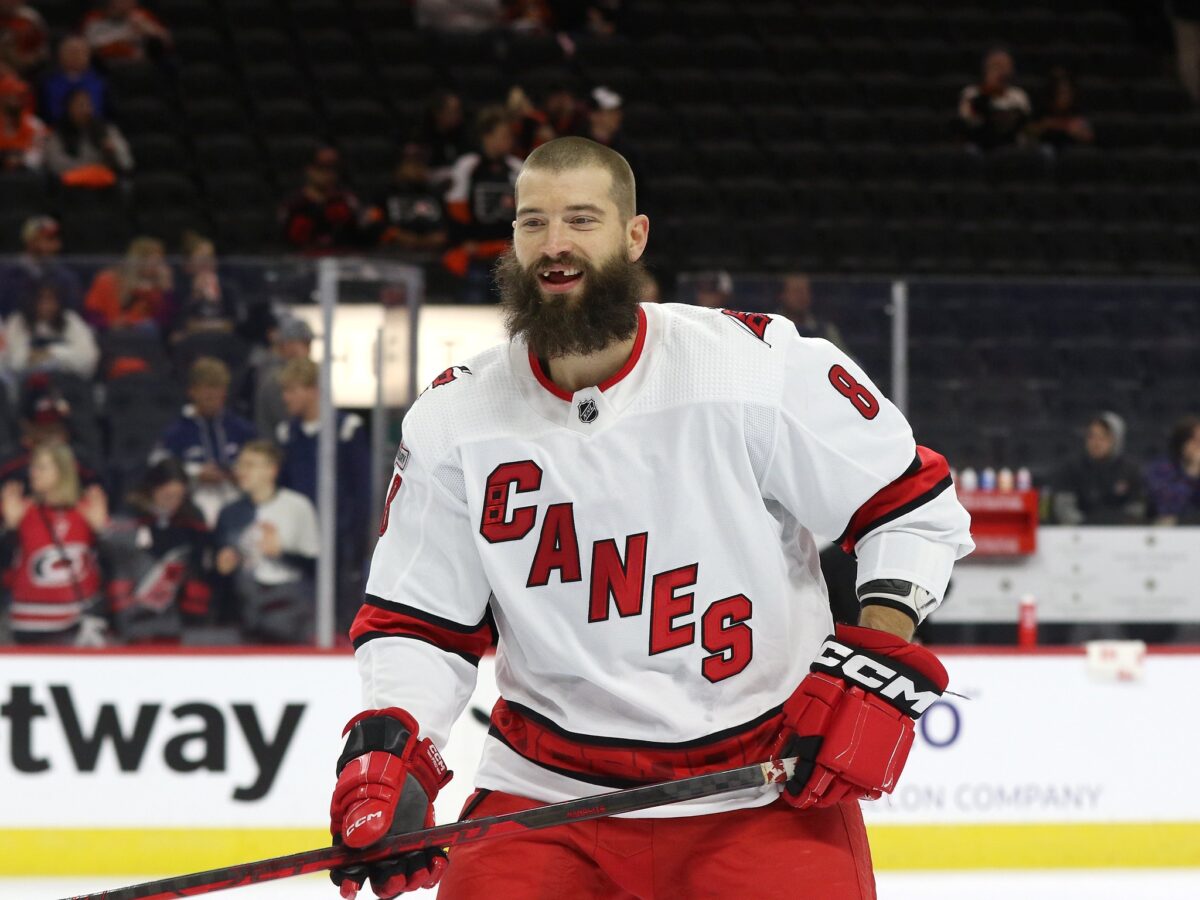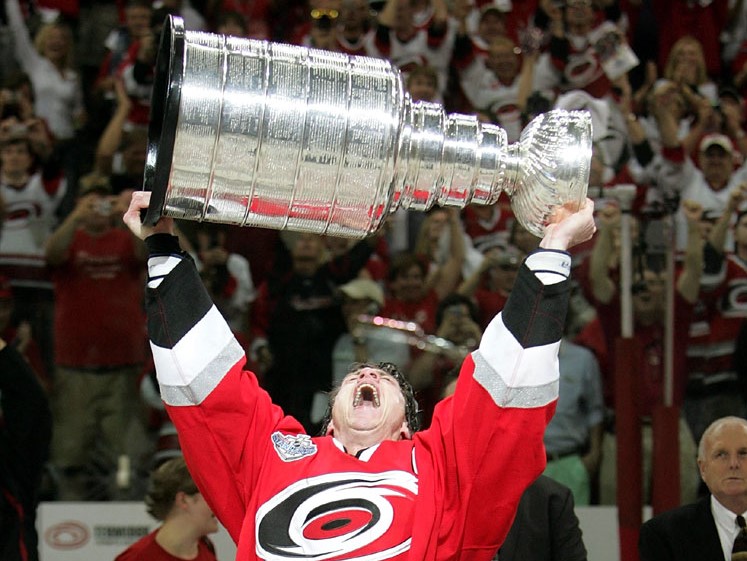In early September, the Carolina Hurricanes announced a group of hirings, including Sidney Morin and Ellen Etchingham as pro scouts, and Earl Schwartz as the team’s compliance assistant. Earl, as many Twitter and Reddit users may know, spent quite a bit of time sharing his incredible knowledge of the NHL’s collective bargaining agreement (CBA). The NHL’s CBA is quite complex and has a lot of information, and he can recite most of it.
I had the opportunity to chat with Schwartz, and talk about his journey to this position. Schwartz, who is only 23 years old, had lots of great stories to tell, including his playing days, a train ride with the Detroit Red Wings’ Jim Devellano, as well as what it is like to work alongside the Hurricanes’ front-office staff.
Schwartz’s Early Days
For those of you who haven’t read Scwartz’s send-off article with LeafsNation, “Goodbye, Earl”, make sure to go check that out.
In Canada, hockey is unavoidable. Sure, there are lots of people who are not interested in the sport, but every Canadian knows a little bit about hockey. For Schwartz, hockey was everywhere.
“I grew up in a really small town in Bloomingdale, Ontario and there was a library that had a handful of hockey books and I read every single one of them, go to your public libraries, they are awesome.”.
He took the time to appreciate the value that minor hockey centers have; from the coaches on the bench to the driver of the Zamboni, he was grateful for it all. After turning 18 and aging out of minor hockey, he wasn’t ready to hang up the skates quite yet. From the parking lot of the Wellesley arena, where he was trying out for a Junior team, he called up the general manager (GM) of Delhi, as he knew they were looking for players, and made the team after one tryout the following week.
“That should have been a warning sign that we weren’t going to be very good that year, but I had a lot of fun there, just getting introduced to the little world of, well, it’s not minor hockey anymore.”
Later in his first season with Delhi, he was traded to Norwich, which happened to be the team he got into a fight with earlier that year. To Schwartz’s surprise, he was greeted with open arms and welcoming texts, followed by a night out where all the players got to know each other. Norwich gave him his first taste at the playoffs in Junior hockey. In a packed arena in Woodstock, Norwich managed to get to double-overtime and the atmosphere was exciting, loud, and most importantly, taught him about how the emotions felt in such an important game, and he latched onto that passion.

“Whether you’re a fan or a player, there are very few things in people’s lives that are as important as sports.”
After playing a season in Junior, Schwartz studied Sports Management at Niagara University and went on to play for the Niagara-on-the-Lake Nationals, and this is where he learned how to use his CBA knowledge to his advantage.
Filling the Void
In college, Schwartz learned a lot about social media, and how much power it had to reach people. After using Reddit to share his information for a number of years, he decided to veer toward Twitter to share his wealth of knowledge on the NHL’s salary cap, CBA, and the fundamentals of how the league ran. There weren’t many people that were able to talk about these things the way he could, and this sparked quite the opportunity.
“I was pretty happy to fill that void and a lot of people wanted that information. Anybody that was filling that void was going to get attention, so I just tried to maximize on it.”
Schwartz went on to talk about how not only was he filling a void regarding this information being on Twitter, but also how he was filling a void in himself. Being able to put his intelligence on these topics out there, whether there was an audience or not, was important to him. Every time he got a new professor in a new class in college, such as his law and contracts classes, he asked them if they knew about the CBA. Nobody really seemed to know about it. Before talking about the things he knew best, he first told people why it got him excited, and how everything worked and then talked to them about the very thing that made him so excited. Even in these classes, he started to realize that this was more of a unique interest, as he didn’t have as much of an audience as he thought he would.
Schwartz learned that the target audience he was looking for was out there, and most of them happened to work for NHL teams, which worked out in his favor.
Compliance Assistant; What Does That Mean?
A lot of people can kind of guess what a compliance assistant might do, which would be to make sure, logistically, the team is compliant when it comes to the salary cap and contracts. Somebody like Schwartz clearly has all of the skills needed to fit in a role such as this one, but that is not everything it entails.
Like most teams, the Hurricanes did not have a compliance assistant position prior to hiring Schwartz. During discussions with the team, he made it known that titles are not as important to him as the role, but he and the team had agreed that the title would fall under the Department of Hockey Operations (Hockey Ops), and together they came up with a fitting title.
“As far as how the title pertains to the job, I mean yeah, that’s the reason I was hired in the first place, my knowledge of the CBA and how the mechanisms work, and how they interact with each other. I wouldn’t call it trying to find loopholes, but if we can become more efficient in different corners of how we do things, we will figure that out.”
The Hurricanes have certainly done some work with the salary cap this off-season, acquiring Max Pacioretty and Brent Burns, and used both of their salaries to only give up a minimal return to acquire both players. This is something that we have been seeing a lot more around the NHL, as the salary cap is no longer rising as it was, due to the COVID-19 pandemic resulting in a flat cap for a number of years.

When talking about his day-to-day, Schwartz mentioned he looks at the other team’s salary situation, how many contracts they have, and certain things to keep an eye on for each team around the league.
“…especially knowing that a lot of teams are blocked off and aren’t able to do certain things, so the more information you can have on other teams, the more informed you can be about your own decision making.”
As part of the hockey ops team, Schwartz is a big part of the decision-making process, led by GM Don Waddell, but most conversations start with Eric Tulsky, who is the assistant GM of the Hurricanes. He inputs his information into a centralized website, where all of the Hurricanes staff can look at all of the data that each member has on every team and player.
Getting Connected to Carolina
In “Goodbye, Earl”, there is a section that briefly talks about his trip to the draft. He didn’t get into too many of the details, so I asked him to share a little more. While he ended up with a position in Carolina, the story started with meeting somebody in a different franchise.
“Hey! Are you Jim Devellano?”
What a start to a train ride. On Schwartz’s way to the draft, he happened to see the long-time executive, Hockey Hall of Fame member, and senior vice president of the Detroit Red Wings, Jim Devellano.
Related: Today in Hockey History: July 12
“We had a good conversation on the way up, and he was just really enthusiastic, and knows a ton about hockey and was super happy to talk about it, so I was just trying to be a sponge and soak up as much information as I could from him.”
Once getting to the draft, Schwartz made his way to the draft floor before picks started being made. He met Aaron Schwartz and Darren Yorke, two staff of the Hurricanes’ hockey ops, and he said they were familiar with his work, and had a good conversation. Again, he said he soaked up as much information from the pair, as they were in a position he aspired to be in.
Once the first round of selections ended, Schwartz made his way back to the draft floor, where he met some people in the media, who he claimed were very generous with their time despite being in such a busy environment. He got to shake quite a few hands, meet some great people, and best of all, catch everyone he met off guard by being a lot younger than most would have anticipated somebody named “Earl” being.
“Saturday I took a train back home and fortunately Jim Devellano is on the same train and so we kind of got to recap our weekend and again, he is such a wonderful guy and we had five hours to talk hockey and there is nothing better than that.”
Schwartz went on to talk about how fortunate he was to have almost all of his work done online, as he was able to pull out his laptop and show Jim a lot of his work. Jim seemed quite attentive to some of the things Schwartz had worked on, as these are some things that the Red Wings vice president might not get to see very much of, in the style Schwartz works in, like spreadsheets and data collection. He said that Jim had a lot of questions, was curious about a lot of the work, and how fantastic of an experience it was being in that position.
Working in the NHL
As a 23-year-old, working in the NHL is quite an accomplishment. One of my biggest takeaways from chatting with him was how humble he is. I mentioned that a lot of the people on Twitter are in their early 20s, or at least in that range and that many who know his story look up to him and are inspired that someone jumped from Reddit, Twitter, and a Maple Leafs blog, to working for an NHL team. His response to this was that he is no different than anybody else who is passionate about the sport.
“…what I would say to those people…I’m no different than you, if I can achieve this, it’s something I have dreamed of for a long time, so for the people with that passion of the game, maybe it’s not this position, but if you want to be on the social team or whatever it is, I think, just treat people well and do your best.”
He mentioned that he has had some lucky breaks, and with his unique interests, it was a different path. There were times when he wasn’t sure if he would ever get his chance, but he also said that whether results come tomorrow, or five years from now, it is worth sticking with your passion. This was a very inspirational segment of our conversation and is true for anybody.
Now working for an NHL team, especially at such a young age, I had to ask him about working alongside some of the great people he had watched play in the NHL, or some hockey legends, such as Waddell and Rod Brind’Amour. He talked about how grateful he was for such a warm welcome to the team. From watching Brind’Amour raise the Stanley Cup in 2006, to shaking his hand walking into the offices, he felt anxious and nervous but said that with all of the respect for each other, those feelings went away quickly.

I then asked if he had any ambitions to take on a bigger role someday, and he immediately gave credit to Waddell, and how big of a job it really is to be a GM in the NHL. “…seeing what Don does, it really cements that it takes a lot and you have to be the right kind of human to do it.” was the quote, and he mentioned he would like an opportunity to be a GM someday, but for now, he is more than grateful for the position he has.
Schwartz took this conversation in a bit of another direction and talked about potentially joining the agency side of things. With so much knowledge of the CBA, the salary cap, and all of the fine details, he would be a huge advantage for any player to have on their side. He talked to a lot of agents at the draft, and got to know a little more about how to take that path, but ultimately ended up with a hockey ops position.
We had a great chat, as everything he had to say came from the heart, and he is a great human being to talk to. There were a lot of inspirational quotes from this conversation, and just as many things to learn from, but of everything he talked about, this may be the best.
“I think in the long run, we all have goals for ourselves in the short term and the long run, and I think what I want to do is eventually be in a position where I have the influence to make changes one way or another. With the people I have to learn from here in Carolina, I am going to try and learn as much as I can from them and try to be a sponge here and take in information and try to grow as a person and a hockey person. I think eventually I just want to be somebody pushing the game in the right direction, making the game more inclusive for people, and just have the brightest minds that we can. I would be fortunate to be a GM, because it’s possible later, right?”
This speaks a lot about how great of a person Schwartz is. He is very selfless, humble, and passionate about the game, and is the exact kind of person that people want around them, especially in the kind of position that can get stressful and tense.